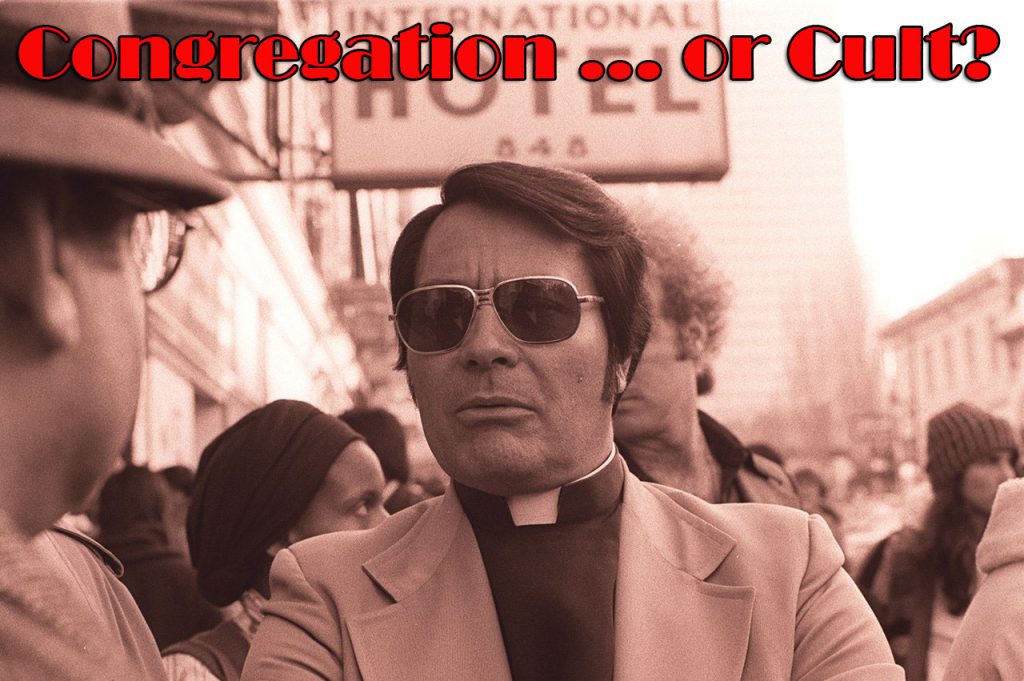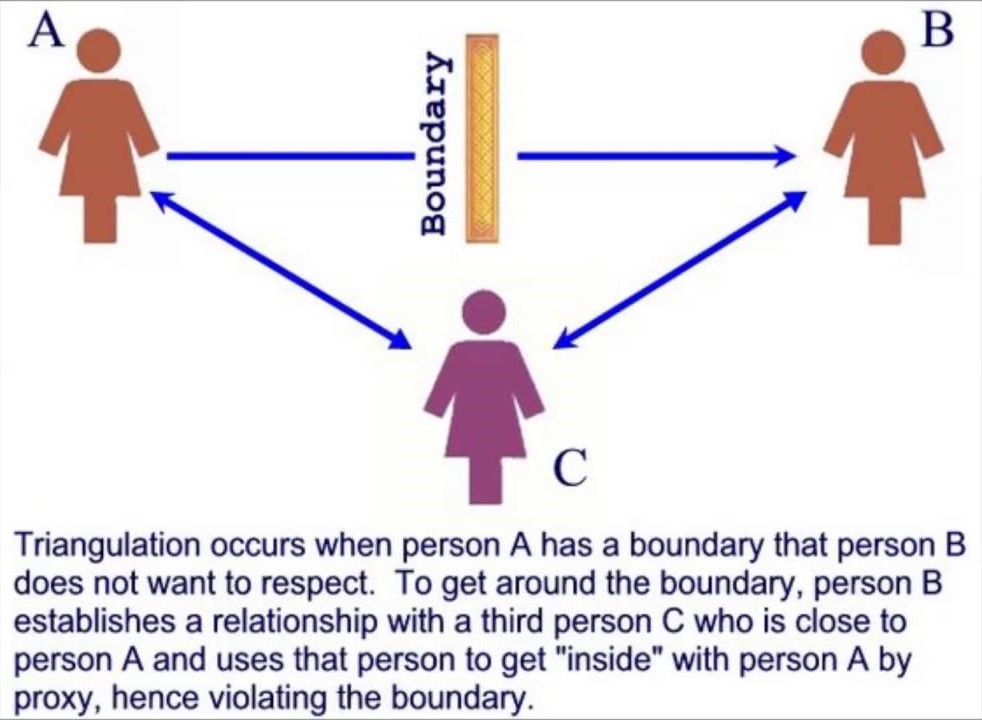January 2022

By this all people will know that you are my disciples, if you have love for one another.
John 13:35
Beware of false prophets, who come to you in sheep’s clothing but inwardly are ravenous wolves.
Matthew 7:15
Prologue
Some years ago, I was in a relationship with a woman who was drawn into a religious cult. The cult manipulated a small group of people and then used them to scam people into making donations and perpetrate other frauds, while claiming to have a direct line to God and spouting off wild prophecies about the end of the world. They travelled a lot, leaving a town whenever people grew wise to their scams. Most of the “followers” came and went, but the cult held tight control over a small core group who obeyed the leader without question. The fact that they were a cult was evident to most observers. However, this got me thinking about whether there were also more subtle cults that could carry on the façade for long periods of time, even indefinitely, while masquerading as legitimate groups. I discovered that there are such groups and even joined one for a time without realizing what it was.
The term “religious cult” conjures up an image of a group of crazy people isolating themselves in a compound somewhere beyond the borders of civilization, hoarding weapons, forcing draconian measures on their members, teaching that the rest of the world is evil and about to end, and possibly even abusing children. The leaders are evil psychopaths with multiple young wives, and the members are mindless sheep of below average intelligence. They eventually come to an end through mass suicide, go up in a ball of fire during a government raid, or when the leaders are imprisoned and the sheep scatter. That is the popular notion of a religious cult. While those types of cults do exist in the extremes, countless others appear mainstream and blend in.
What is a Cult?
For purposes of this writing, a cult is defined as a high-control group with a central ideology or leader characterized by manipulation and exploitation of its members.
A cult is a destructive group. In non-destructive groups, the leaders keep the veneration and attention on the group’s aims, whether those aims are political, religious, educational or something else. In destructive cults, the leaders keep the attention directed towards themselves. What makes a group destructive is the presence of authoritarian leadership, deception and mind control. This authoritarianism and control might be a lot more subtle than you think. Skilled authoritative leaders often play the humble servant role very convincingly. Here are some questions you can ask yourself:
- Is the group teacher/leader the only one who makes decisions?
- Are they answerable to anyone?
- Do they actually have the titles they claim to have?
- Do they tolerate criticism or allow questions?
- What kind of relationship do they have with the people around them?
- What do they call themselves? Master? Guru?
- Is the group offering exactly what they say?
- Are the actions and words of the leader and the members congruent? Or are they saying one thing and doing another? For example, is the leader talking about living a simple life but spending a lot of money?
The Congregation
I move to a rural area some years ago, after living in a big city for many years. I found a small congregation of my faith and checked it out. The leader was very down to earth, willing to talk almost any time, and not afraid to engage in conversations about the deeper and sometimes confusing aspects of the faith. I found this a refreshing change from the haughty, “make-an-appointment” unapproachability of big city religious leaders. The people of the congregation were friendly and somewhat outgoing. The leader lived very austere, in a one-room house on some rural acreage. All the worship and teachings seemed to fall in line with the doctrine of the bible. There was no fanatical rhetoric, no rigid requirements, no smooth-talking sales pitch. People seemed to come and go as they pleased. Most of the congregation were homesteaders or small-town people, who were well below the median average of big city income and content with the basics of life. They worked hard and seemed to be humble. They simply wanted to worship God in the way He stated in the bible.
However, over time I began to have misgivings. I began to see some of the same nuances and tactics used by my ex’s cult, only more subtle and harder to detect. There seemed to be a rigid inner circle, the leader’s wife claimed to have dreams from God, and there was a push for the congregation to be an intimate “family.” There was also a small, but steady, exodus of people who were never mentioned again afterwards. My misgivings went into high gear when the leader summarily dismissed one of the teaching elders, a friend of mine. I witnessed the event. The leader was way out of line, violating not only biblical principles, but also Leadership 101 by chewing out the elder in front of others based only on his opinions rather than any facts. Afterwards, he refused to speak to my friend again. He also lied, claiming he never threw him out of the congregation, but that he left of his own free will. No humbleness at all, just the very pridefulness he preached against. However, the insidious thing is that the entire congregation cut off contact with the elder en masse. One of the more senior members of the inner circle asked me a few weeks later what the story was with my friend. I told him, “Give him a call and ask him. He’d probably love to hear from you.” No call was ever made. In retrospect, I wonder if that person had already cut him off but was just fishing for information. I decided to stay, but I kept my eyes and ears wide open, and my mouth mostly shut.
Gathering Data
American psychiatrist and research scientist Robert J. Lifton published a study on the psychology of totalism and thought reform in 1961. Totalism is a concept that is not well understood. The word “totalist” fails spell checking in most software and Google returns a type of music genre. The definition here is a group, organization or government in which one authority wields absolute power. In a nutshell, a cult. The concept of totalitarianism derives from this. Dr. Lifton discovered eight criteria of thought reform and control used by cults and other totalist organizations or societies. These criteria are:
- Milieu Control
- Mystical Manipulation
- Demand for Purity
- Cult of Confession
- Sacred Science
- Loading the Language
- Doctrine Over Person
- Dispensing of Existence
I used these criteria to try to determine whether I was in a congregation, or a cult. I will describe how each of these criteria was met in the seemingly innocuous rural congregation of which I was a member. I was guided through the process by Dr. David McDermott, a counselor specializing in cults and psychopathy of their leaders. Every cult has a public-facing image that is mainstream and appears normal. Then there are successive layers of increasing control, and often bizarre dogma, until you arrive at the inner circle. This congregation was no different. Here is what I discovered.
Milieu Control
Control of all communication and information, which includes a person’s internal self-communication. This sets up what is called “personal closure,” meaning that followers no longer need to struggle or think about what is true or real. Ultimately, this prevents doubting and self-questioning.
I was very familiar with control of communication and information. I witnessed my ex’s cult construct an enclosed system that restricted these, both in her cult and in our family. This type of system was not present in the congregation, or so I thought. However, over time I noticed that there was very structured groupthink in place. At first, I ascribed it to following a common biblical doctrine, but I noticed that whenever the leader’s definition of that doctrine changed, so would that of the group.
The leader was very open about talking through these things. At first, I thought it was because he was open minded and wanted to find the truth. Looking closer, I discovered that he skillfully used these opportunities to mine for information and manipulate the person who asked the questions onto the track he wanted them to follow. As an example, one man often engaged the leader in questions about biblical doctrine with respect to struggling with his own personal pride. After that, every time the man deviated from the path the leader wanted or showed some critical thinking, he was told that he was being “prideful” and that it was a sin. The leader skillfully targeted people’s weaknesses and desires to control them.
Another man flip-flopped between blowing up at the leader over various things and being excluded from the congregation for several weeks, and then returning more highly motivated than ever. It was a very strange, even disturbing, dynamic to watch. I still don’t fully understand it, but somehow the leader was able to harness it to have the man champion his ideas and become one of his most steadfast lieutenants.
I later discovered the dynamic at work here. It is called intermittent reinforcement. The delivery of a reward at irregular intervals, a method that has been determined to yield the greatest effort from the subject. The subject does not receive a reward each time they perform a desired behavior according to any regular schedule, but at seemingly random intervals. When the reward is withheld, the person works twice as hard to get it back. The leader did this over and over again to the man, who doubled his efforts each time. The leader probably pushed the man’s buttons repeatedly to get him to blow up so he could throw him out of the congregation. Then when the man kowtowed to get back in, the leader would reward him, only to do the same process again a few months later. For the man, obedience = reward. This man became the leader’s most trusted lieutenant. He publicly stated that he would give his life for the leader. The members began to call him “The Enforcer.”
In summation, nobody questioned the way the leader did things, at least not if they wanted to stay around for very long. Every person was different as to what extent they would obey, but disobedience was never in areas that seemed to matter to the leader. People who violated his non-negotiables were quickly dismissed and vilified behind their backs. The leader usually confronted them privately, and some of them related that he was very nasty about it, in stark contrast to his kind and humble public persona.
Mystical Manipulation
The claim of authority (divine, supernatural, or otherwise) that asserts the ends justifies the means, because the “end” is directed by a higher purpose. Certain experiences are orchestrated to appear as though they are occurring spontaneously. The follower is required to subordinate himself to the group or cause and stop all questioning, for who can question “higher purpose”? Self-expression and independent action wither away.
The leader’s wife claimed to have dreams in which God told her what the congregation or individual people should do. She made a big push at one point, claiming God told her that everyone in the congregation had to publicly confess theirs sins in order to find repentance and salvation (See Cult of Confession below). She said this had to be done before a certain date because God was going to move on that date and make terrible things happen. (Nothing happened on that date.) She also stated that God would reveal to her the sins of those who would not confess. (I did not confess, and my sins were never revealed to her.)
On a personal note, the leader’s wife had another dream that revealed the woman who would be the mother to my child (I am a single father). She and the leader approached me about this, stating what a wonderful woman she was, very godly and a good church member. I was not in the least bit inclined to accept, firmly believing that I am the one who chooses who I marry and that God will either permit it or not. Also, having come out of a very bad marriage to a woman who was also initially lauded as a godly church member, I was very wary of this type of setup. I politely told them I was not interested. They did not overtly push the issue but did let me know I would be missing “a blessing from God.” This was a blatant attempt at guilting. The woman who they were trying to get me to marry was very loyal to both the leader and his wife. What better way to control a man and keep him in line, than through his (new) wife? [A few months after I left the congregation, this woman married a man who had newly joined the group. This man possessed considerable wealth and was able to provide the church (i.e. leader’s property) with considerable infrastructure upgrades. I don’t know if the leader and his wife used the “dream from God” tactic to arrange this, but it would not surprise me.]
More attempts at guilting followed. A prominent woman in the congregation started making comments that I was neglecting, even abusing, my child, insinuating that I needed a woman in my life to take care of things. On one occasion, she loudly proclaimed to another woman within my hearing that no man, even the father, should ever bathe his daughter. I asked, “Then what do you suggest I do? Should I call you every day to come over when it is bath time?” She replied, “Oh we didn’t mean you.” Right. I was the only person, and man, within earshot. Another attempt at manipulation through guilt.
This manipulation was a huge violation of personal boundaries and probably the biggest factor that drove me to leave the congregation. Not a single “dream from God” the leader’s wife proclaimed ever came true during the time I was with the congregation. The bible itself, the religious doctrine of this congregation, speaks out very strongly against false prophets – people who claim to have visions from God, which do not come true. Yet, this type of mystical manipulation continued with impunity.
Demand for Purity
Essentially a black-and-white worldview with the leader as the ultimate moral arbiter. This creates an atmosphere of guilt and shame, where punishment and humiliation are expected. It also sets up an environment wherein members spy and report on one another. Through submission to the guilt-inducing and impossible demand for purity, members lose their moral bearing.
The leader taught absolute adherence to biblical commandments and doctrine, which is not necessarily a bad thing, but then he would change the interpretation of those commandments and doctrine to fit the current agenda. Everyone outside the congregation, even those of the same faith, were cast in the light of doing it wrong and destined for hell.
The leader did not follow his own or biblical rules of purity, although one had to look carefully to determine this. He talked a very good game and, on the surface, seemed a humble man. If I had not personally witnessed the way he publicly chewed out my friend and cut him off for no valid reason, I probably would not have questioned things for quite some time to come. He preached humility externally but was very prideful himself internally.
The leader and his wife vigorously preached against gossip, stating that it was the equivalent of murder. Nobody was to discuss anyone else’s personal business, whether negative or positive. Behind the scenes however, the leader vilified church members to others and created negative stories to justify those he had expelled. Other negative fiction was created for church members who left the congregation on their own. This “gossip” was not stated publicly, but rather on an individual basis to members of the inner circle, framed as “church discipline” or letting go a person who would not follow God. The gossip was often tailored to the individual to whom the comments were made, pandering to their desires or weaknesses.
Dr. McDermott informed me that this is a common cult practice called explicit versus implicit rules. In the above example, the explicit rule is “Gossip is evil, so no gossip.” The implicit rule is “If you don’t conform, we will rip you to shreds behind your back.” The rules contradict each other, creating an environment of both confusion and fear, enabling the leader to better control the group. The implicit rules are ingrained into a person at the emotional level, because of how the person is treated when they are violated. Thus, they are likely to be obeyed even when the manipulator is not present. If you feel uncomfortable when making a seemingly simple choice, it is likely that an implicit rule is in place.
Cult of Confession
Involves an act of surrender and total exposure. The follower is now “owned” by the group. The follower no longer has a sense of balance between worth and humility, experiencing a loss of boundaries between what is secret (known to the inner self) and what the group knows.
The leader and his wife conducted character building classes where people were encouraged to confess past sins (See Mystical Manipulation above). One couple confessed their entire lives to the congregation, including highly personal things like prison time and infidelity. These confessions were later used to keep them in line when they deviated from the leader’s plan. “Remember where you came from. Do you want to go back there?” It also created a strange and uncomfortable dynamic for me and others interacting with them after that.
In this vein, a man who was courting a woman in the congregation was encouraged to open their courtship up to the entire congregation and invited them to speak into it. All this was, of course, guided by the leader and his wife. His efforts were genuine and sincere, trying to model the biblical role of a man as the leader presented it. However, the leader used the personal information to manipulate him and the woman. At some point, the leader decided that this man was a threat of some sort, so he convinced his new wife to divorce him. The leader cited the man’s violation of God’s commandments as his reasoning, however he did not discuss this with the man directly, just interfered in his marriage behind the scenes. The man was encouraged to confess his sins, which he did with sincere motives, but they were just used as additional fodder to remove him from the group and shun him. This is huge blurring of the boundary between person and group, private and public, yet it was approved and applauded.
This confession pressure made many people uneasy, especially the men, so the confession push was devoted mainly to the women’s group, making periodic overtures to the men to do the same. The man who did confess his life’s sins to the congregation seemed to become angry that no other men confessed and pushed for them to be more open and do so. The leader gave him elevated authority to aid in this. I became very uneasy just being around him because of the frequent push to bare my soul.
Sacred Science
Describes how the group’s doctrine is seen as the Ultimate Truth. Here, no questions are allowed. This reinforces personal closure and inhibits individual thought, creative self-expression, and personal development. Life can now be perceived only through the filter of the dogmatic “sacred” doctrine.
The leader portrayed himself as having superior knowledge of God and His word. He was very learned and appeared to encourage dialog but cut off people completely whenever they continued to dissent and not give in to his interpretations. He frequently stated, “If you don’t like it, talk to God about it.”
The leader’s wife claimed a direct line to God through dreams in which God told her what the congregation or individuals were required to do. While this is not unheard of in congregations, it is generally ignored or humored as a sign of excessive zeal combined with little common sense. In this congregation however, it was given power and credibility.
The leader claimed ancient knowledge of the Bible, along with a mystical coding system that unlocked hidden meanings lost to modern churches. He also claimed to be ordained by God, holding a position of authority over the members of the congregation. Every single teaching and worship session was inspired from God directly to him. All he or his wife had to do was claim something came from God, and the congregation fell right into step.
Loading the Language
The use of jargon internal to (and only understandable by) the group. Constricting language constricts the person. Capacities for thinking and feeling are significantly reduced. Imagination is no longer a part of life experiences, and the mind atrophies from disuse.
Whenever a man would not adhere to the directives of the leader or his wife, he was deemed “prideful” or “unteachable.” If he fell back into line, he was permitted to stay in the congregation. If he did not, he was expelled from the group. Whenever a woman would not adhere to the directives of the leader or his wife, she was declared “unwilling to submit to biblical authority.” Again, if she fell back into line, she was permitted to stay in the congregation. If she did not, she was expelled.
Any time there was dissent or unwillingness to go along with something, the words “prideful, “unteachable,” and “biblical authority” were spoken. The congregation repeated these and affirmed the transgressions of the one who dissented. The leader frequently preached on “biblical authority” and the need for order in God’s kingdom. He stated that he was the ordained biblical authority, and that people could not do as they pleased and still be following God. However, there was never any indication that he followed the authority of anyone, except for God and who was going to corroborate if what God presumably “said” to him or his wife was actually true?
The word “gossip” was also used to quickly shut down any talk that the leader or his wife did not want. Telling anybody outside the congregation, especially former members, anything at all was labeled “gossip” and strongly condemned. A former member contacted someone within the congregation to inquire about their health. The leader went off on an angry tirade explicitly forbidding this type of contact as gossip, stating that former members were enemies who held grudges against the congregation. He forbade speaking to them about anything within the congregation (see Dispensing of Existence below).
Bible verses and biblical words were re-purposed to provide a quick and easy way to shut down and deflect dissent. They were repeated many times until their reinterpretation became accepted truth, a tried-and-true indoctrination method. This provided the added benefit of having the congregation also repeat these words to shut down any dissenters.
Doctrine Over Person
Denial of the self and any perception other than the group’s. There is no longer any personal reality. The past – both society and the individual – is altered to fit the needs of the doctrine. Thus the follower is remolded, the cult-shaped persona is born, and the person’s sense of integrity is lost.
The church leaders would strongly suggest to you who to marry, how to parent, where and how to work. There was a strong overtone that a church member’s free time belonged to the church. The leader and his wife announced regular “workdays” where people were encouraged to help build the church infrastructure, which happened to be on the leader’s property or the property of someone in the inner circle. There was a roster of “on call” church members who were responsible 24/7 for any maintenance emergencies on the church (i.e. leader’s) property. Those who did not participate in this work were indirectly shamed by publicly praising people who did the work and enumerating how they were able to do so despite their age, finances, work, family situation, etc. This made people who were not similarly constrained feel guilty for not working, as well as invalidating any valid reason a person might have for not participating.
The leader used his pulpit as a platform to enlist congregation members as laborers to do free work in a senior member’s side business, renovating a house for sale or rental. He stated, “we are all family, and this is what family does for one another.” He also stated that the church (i.e., him) would get a cut from the business efforts, so this would be helping the church too. This was unethical manipulation to obtain free labor for a private business enterprise, for which the leader would get a cut. If the business owner had requested help from church members on his own, that would have been a different matter. The leader using his authority to do this and framing it as a church endeavor was very manipulative and unethical. Ironically, the house burned down a short time after renovations were completed. The leader made no mention of “helping family” to now assist the congregation member clean up the mess even thought help was needed now more than ever. There was no longer any benefit to the church (i.e. him). The definition of family appeared to be highly conditional.
I found that even after several years, there was no adult in the congregation who I felt I could trust. Ironically, there were people outside the faith, even atheists, who I could trust. What is the purpose of a belonging to a church congregation in which you cannot trust anybody?
I also began noticing that, although the leader seemed to live an austere life in a very humble abode, he did buy himself some very nice toys with his church income. One of the church elders, later dismissed for being “prideful,” confided in me that the leader was irresponsible with the church finances and used the money as his own personal checking account. He had church members take out loans in their names to aid with the building of the church infrastructure on his property, then make the absolute minimum payments, keeping the loan afloat for a long time in the other person’s name. This is not only unethical, but it also presents major legal problems for a non-profit organization if discovered. A background check later revealed that he had a history of serious financial problems, yet he refused to let anyone manage the church finances for him.
The leader used the doctrine to manipulate and pressure people into staying with the congregation rather than moving to another area or group that better suited them and their needs. Once again, this was never done publicly, but always in private with the manipulation tailored to the individuals fears and weaknesses. He told one church member that God would not bless his decision to move to an urban area where he could find better employment and that if he attempted to do so his efforts would fail. He told another church member that she would go to hell if she did not attend official church holy days in the manner specified by the leader.
Dispensing of Existence
The process whereby the group becomes the ultimate arbiter and all nonbelievers become so-called evil or non-people. If these non-people cannot be recruited, then they can be punished or even killed. This process creates an us-versus-them mentality that breeds fear in followers who learn that life depends on a willingness to obey. This is when individuals merge with the group’s belief.
Preaching and worship usually had an us-versus-them mentality. Our faith versus the outside sinners. While that is not uncommon in mainstream churches, there was also talk that our congregation was more pure and correct in our faith than the others of the same faith, which seemed to cross the line into arrogance. Also, our congregation would completely cut off people who left or were thrown out of the congregation, which is cultic.
At first, I did not hear any direct instructions to shun or cut off people who left or were thrown out of the congregation. I was not a member of the inner circle, so perhaps that occurred within it. However, it was very clear by actions that former members were cut off and shunned, irrespective of how that was communicated or enforced. Towards the end of my stay however, the leader would send group texts chastising congregation members for telling former members of anything going on within the church. He went so far as to proclaim that former members are “not your friends” and that they “hold a grudge” against you. He also stated that former members refused to submit to biblical authority (i.e. him) and therefore they were not of God. He directed that members should tell them nothing that was going on inside the congregation.
Fictional negative back stories were also created to support the expulsion of members or explaining why others left of their own accord (See Demand for Purity above). Many of these stories differed depending upon to whom they were told.
The leader commanded a woman to divorce her husband for not submitting to his (the leader’s) authority. She dutifully obeyed and the leader threw the man out of the congregation. The leader framed this as the man being unwilling to obey the Bible and unwilling to submit to the leader’s “biblical authority.” Congregation members turned their back on the man and the wife lived on the leader’s property. This is a blatant cult move.
When I stopped attending worship meetings and church events, texts started flooding in from a half-dozen different people asking where I was. A member was even sent to my home to check on me. However, once I made it clear that I was leaving the congregation, the texts stopped immediately. This clearly indicated that there was a communication chain in place for shunning members who left or were expelled. The leader, to whom I had sent the message that I was leaving, had been sending texts telling me how “genuinely concerned” he was about me. Not a single message after that. Not even, “Sorry to see you go” or “Good luck” as any normal person might have said. All phony and contrived. All that mattered to him was, are you with me or not.
I apparently had no friends in the congregation, even after being there over 2 years. They call you “brother” one moment, then deny your existence the very next. Not because you hurt them, did something evil, or even did something criminal – but simply because you don’t belong to their club anymore. These were people and families with whom I worshipped, laughed, sang, shared meals, played, went camping, pursued sports, and did communal work for over two years. Scores of them. Every single one of them cut me off cold when I stopped following the directives of their spiritual leader. Just as they had done to all the outcasts before me. I was fairly certain this would happen, but the reality is always stark. Basically, to have these people’s friendship, or even have them acknowledge you as a human being, you must belong to their group. No thank you. I don’t need or want “friends” like that.
[A few months later, I had a chance encounter with a congregation member outside the inner circle, who told me that the congregation had been told that I was leaving and requested that nobody contact or “bother” me. At first this seemed a bit odd, but made sense after further reflection. I had provided no information about my motives, which could be twisted or misrepresented in some way. “Don’t bother him” still had the desired effect of cutting me off while making it look like it was my fault, not the leader’s, especially when framed as a false request that I never made. The members obeyed this instruction just as they did all others. Some other members I ran into after that had been told that I moved away.]
Epilogue and Conclusions
Religion and faith are often absolutes by necessity. The bible is an exclusive doctrine of commandments to be followed as a part of that faith. Some people find that offensive, but the doctrine itself is not the issue. The issue is when a person uses that doctrine to set themselves up as the arbiter of all, and thereby controlling and exploiting group members. Unfortunately, this happens a lot, which is one of the reasons why religion is hated by so many.
Answering the questions posed earlier:
- Is the group teacher/leader the only one who makes decisions? – Yes
- Are they answerable to anyone? – No
- Do they actually have the titles they claim to have? – Unknown and unverifiable
- Do they tolerate criticism or allow questions? – No
- What kind of relationship do they have with the people around them? – Dominant and volatile
- What do they call themselves? Master? Guru? – Prophet
- Is the group offering exactly what they say? – No
- Are the actions and words of the leader and the members congruent? – No
Religion is a very lucrative schtick for people with psychopathic personalities and plain old con artists. If you can convince a person of faith that you have a direct line to God, that God speaks to you, or that you have superior knowledge of God, then the sky is the limit in terms of how much you can exploit them. There is also the added benefit that, if you are found out, most people of faith will forgive you rather than turning you in to the authorities. Some will even let the exploiter exploit them a second or third time.
I believe it is possible that the leader chose a rural area in which to set up his congregation because the people there, while few, would have limited options. He was the only show in town. Once they found a group of their faith in which to worship God, they would be very hesitant to leave if there was no place else to go. Also, there were no other churches of the same faith that might have presented an accountability structure. The leader could run his show exactly how he wanted without any interference.
Initial interaction was pleasant and welcoming, but the subtle manipulation began after a few months. There was also a noticeable probationary period during which they attempted to recruit a new person into the inner circle. I failed that period and was relegated to the larger group of not-so-faithful, but still potentially useful, members. Manipulation continued to attempt to exploit me more effectively and perhaps bring me around to see the “wisdom” of joining the inner circle.
As far as I can tell, the leader and his wife exerted strong control over the inner circle, who in turn reinforced the tone and standard for how the rest of the congregation should think and act. The remainder of the congregation was a permeable layer through which people entered and exited, with a select few worthies drinking the Kool-Aid and being admitted to the inner circle. The benefits to the leader and his wife were a free place to live and a steady, if not large, income for a minimal amount of work. They were also able to meet what appears to be a desire to control others and receive admiration. I can only speculate on the motivations of the inner circle, but many cult “lieutenants” sincerely believe in what they are doing.
Be very careful, even with organizations that profess the same faith you follow. Sharing a certain ideology does not automatically make others sharing it trustworthy and safe people. Even those who believe they are sincerely following it can have toxic traits or characters that can make your life a living hell. Those who are not sincere can be even worse, using your own beliefs to ensnare and control you, while you continue to believe it is your own free will. Use discernment, double check everything they say with reputable, 3rd party sources, and take care not to let your emotions override your judgment.
Was the Leader a Psychopath?
I am not qualified to determine this, despite my years of research in this area. Scientific writings and modern culture caution against applying labels to people without very careful analysis and consideration. What the lay person can do however, is identify toxic and potentially psychopathic actions that another person exhibits and have this aid them in their decision making about whether to associate with or accept counsel from that person. This can help them protect themselves from being manipulated or exploited. The leader possessed the following traits that can be indicative of psychopathy or another aggressive personality disorder, like narcissism:
- History of financial irresponsibility
- History of not paying debts
- Telling lies / actions not matching words
- Volatility when challenged or contradicted
- Impulsivity
- Superficial charm and charisma
- Deception and manipulation
- Black or white thinking, such as cutting off people completely for perceived infractions
- Aliases
- Living off others
These are only some indicators of a psychopathic personality. There are others that he did not display. It is up to the individual to decide whether this is enough to warrant not associating with the person or group they lead. My decision was that these traits, combined with the cultic nature of the congregation and attempts to manipulate me, were sufficient to warrant not associating with him or the congregation anymore. This is a personal decision, not a professional medical decision. I hope that my thought process and analysis will be beneficial to some of you who are facing similar situations, to make your own personal decisions about how to proceed. As always, analyze carefully, don’t engage in conflict, be careful what you share with others and get a professional opinion if possible. Often, it is pointless to try to convince anyone else in the group of what is going on. It usually just results in them turning on you. Do so at your own risk.
Update
The man whose wife was manipulated into divorcing him confronted the leader publicly via email, including the entire congregation. He calmly and logically pointed out how the leader violated both personal boundaries and biblical commandments. Another man, who had been bullied for months by one of the leader’s lieutenants supported him. The leader did not address any of the issues that were raised. Instead, he took to slandering the men on social media. He never mentioned their names, but it was clear to the congregation about whom he was writing. This is classic misdirection used by narcissists or psychopaths. Side step the issue and attack the person calling them out. Below is some of what he wrote on social media.
For all these “so called Bible believers,” thus says the Bible:
Exodus 22:28
You shall not revile God, nor revile a ruler of your people.
Bringing false accusations against an ordained leader of God is equated as bringing false accusations against God Himself! This is a negative commandment in the Bible and carries a lot of weight. Ordained leaders in the Bible were NOT equals with the people of the land. Not even Michael the Angel would accuse Satan due to Satan’s position, but rather said, “The Lord rebuke you (Jude 1:9).” It is amazing how the rebels in this body today have NO fear of heaven or consequences.
Notice the mind control technique used here. He never came out and declared himself the God-ordained leader and ruler, to whom they owe loyalty and obedience. He left it just vague enough for congregation members to make that connection themselves. Having done so, it is now their own belief. They own it and they will defend it, thereby also defending him. He manipulates and controls them, yet they firmly believe it is their own choice. This is more powerful and insidious than simple brainwashing. The responses of the group members say it all.
- I and my family stand with you!
- You are the prophet!
- My wife and I stand with you! We fully understand loyalty and submission to God and His authority structure.
- We stand beside and alongside you.
Through this mind control, the leader solidified his position as an ordained leader of God, without a shred of proof as to why he should hold that position. The people succumbing to this did not lack intelligence, wisdom or discernment. Everyone is susceptible to mind control unless they learn how it is done and how to defend against it. Normal people do not employ mind control tactics, so normal people tend to take a person’s kind, humble or authoritative words at face value instead of suspecting them or digging deeper to see if their fine sounding words match their actions. The leader then continued with:
A righteous community can only be built in trust between the shepherd and the community. Once trust is lost, the community suffers. There is nothing worse than a shepherd not trusting the flock or the flock not trusting the shepherd. This is the goal of the evil inclination for the righteous community. Praying much for God to bring in loyal warriors and watchmen. This is the season that God is separating His loyal ones, and the wolfs and goats are being judged. Do NOT fellowship with these anti-Semitic people. You all will see the end of these rebels. Watch how God deals with them.
Notice the use of “loaded language” designed to bypass critical thinking and elicit strong emotional responses. Words like righteous community, trust, evil, loyal warriors, anti-Semitic and rebels. The leader had repeated these words many times during the course of his preaching before the congregation, usually in conjunction with a heightened emotional state such as loud exhortation or immediately following dancing and singing. Repetition is one of the oldest and most common methods of indoctrination. If you doubt me, just watch our media and politicians. Imagine the poor children in the group who are subjected to this before they even have a chance to develop any critical thinking!
His final statement of “watch how God deals with them” is his setup for future manipulation and control. If something negative, no matter how small, should befall those who opposed him, he can claim that he foresaw it and that it validates his position of authority. If nothing befalls them, he can claim that it was his prayers to God that saved them, portraying him as a merciful and kind man, who also happens to have a direct line to God. He wins either way and further strengthens his control.
After all this, the congregation did not remember the logical and valid points made by the man confronting the leader. They did not remember or examine the exposed inconsistencies of what the leader said and did. They did not give a second thought to how the leader had violated both basic human boundaries and the very doctrine he claimed to uphold and teach. All that the people remembered was that the man confronting the leader was an evil, anti-Semitic rebel who was going against God’s anointed authority. It works, every time.
Final Update?
Another two years later.
The cult leader succeeded in transitioning the group from the previous religious ideology (Hebrew Roots) to a new one (Conservative Judaism). He received great acclaim from Jewish organizations across the state and nation as a “Christian pastor” who saw the light, rejected Jesus, and joined Judaism. He led his congregation to truth. For several months, he was the star of multiple online articles heralding this transition. He basked in the warm glow of the spotlight. Crack cocaine for the narcissistic supply of attention and admiration.
Never mind having left over two thirds of the original congregation in the dust because of a personal choice he made. These were people who had joined the “church” to follow a religion in which they believed, only to have the rug pulled out from under them by a “pastor” who changed his mind every few years. But wait. It gets better.
Fast forward two more years and the leader decides that Conservative Judaism is not the correct religious ideology after all. He laments that there is not enough monetary support. He states that a minimum amount of $10,000 a month is required to have a qualified religious teacher on staff. Him, of course. A handsome salary even for a corporate executive, but the leader berates the congregation that if they are serious about this walk, then they should pony up. A few weeks later, he announces that he will be transitioning to Orthodox Judaism. The congregation can follow, if they want, but he will not have time to devote to regular meetings, teachings, or holy days. The congregation is on their own.
There is one small wrinkle, however. The congregation showered him with a lot of money over the past 10 years. Money on which he paid no taxes, since his group was deemed a non-profit, religious organization. Money that improved his originally barren 10 acres of property with several permanent dwellings, roads, a deep well, electricity, two meeting halls, fences, gates, a parking lot, and improved camp sites. All of this is in his name, not the organization. Thank you, loyal followers, for building my compound. Now don’t let the door hit you on the way out. What a lucrative schtick!
It is certainly a person’s right to change their opinions and faith as they progress through life. However a teacher of the faith should have already done all of that. If a person is still exploring, then he has no business teaching others how to do it the “right” way. On the rare occasions that a religious teacher or leader has a legitimate change of faith, then he leaves that congregation. The congregation isn’t supposed to be run exclusively by him anyway. The people who still follow the original faith stay. The teacher leaves. In the case of this cult, the teacher threw out the people and kept everything. This not only runs counter to the very biblical doctrine the cult leader taught, but can also be construed as outright fraud.
I submit that the cult leader probably did not believe in any type of faith at all. It was simply a vehicle to get him what he wanted: admiration, money and power. When one vehicle no longer sufficed, he switched to another that served him better. Sadly, he dragged scores of sincerely faithful people along with him, using them for money, admiration and a feeling of power over them.
As stated before, always check into a religious group’s structure and finances before joining and contributing. Is it run by a committee, or one person/family? Is the pastor also the administrative leader, or is it governed by a council who can overrule him? Are the finances handled by an independent treasurer or committee, or the leader himself? Is the leader accountable to anyone for spending? Are the property and land in the name of the church, or the individual? In this cultic group, the leader controlled all of it and the property was in his name.
Thank you for playing our game, folks. Goodbye. This is the endgame for cults. When the leader has extracted everything he wants, or if he just grows bored, or if the praise and adulation he craves are no longer flowing in … he packs up his bags and leaves. The people who believed in him or his professed ideology are left hanging.
But Wait, There’s More
Like a bad movie or relationship, a cult leader just lingers on and on. Just not with his cult. Often the shepherd leaves.

















